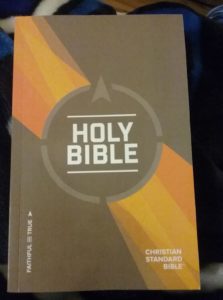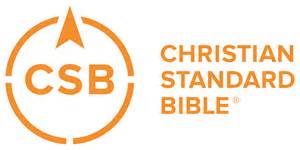By: Brian Chilton | February 27, 2017
 I was privileged to receive a free review copy of the newest translation produced by Holman Bible Publishers, the Christian Standard Bible (CSB). The CSB is new translation which serves as a revision of the Holman Christian Standard Bible (HCSB). The HCSB was known for holding a wonderful blend of readability and accuracy. The CSB brings the same aspects of the HCSB to the table. For many, including myself, the HCSB held some quirks that made the translation difficult to understand in places. The HCSB often felt as if it was distant from other translations to a degree. For example, the HCSB was widely known for using “Yahweh,” the personal name for God, in numerous Old Testament passages while most other Bible translations used the traditional all-capped term “LORD” (following an ancient tradition dating back to the translation of the Septuagint). At times the HCSB used the traditional all-capped LORD. Yet, the translation used on multiple other occasions the personal name of God. The CSB has removed this difficulty as it has gone back to the traditional usage of LORD for the name for God.
I was privileged to receive a free review copy of the newest translation produced by Holman Bible Publishers, the Christian Standard Bible (CSB). The CSB is new translation which serves as a revision of the Holman Christian Standard Bible (HCSB). The HCSB was known for holding a wonderful blend of readability and accuracy. The CSB brings the same aspects of the HCSB to the table. For many, including myself, the HCSB held some quirks that made the translation difficult to understand in places. The HCSB often felt as if it was distant from other translations to a degree. For example, the HCSB was widely known for using “Yahweh,” the personal name for God, in numerous Old Testament passages while most other Bible translations used the traditional all-capped term “LORD” (following an ancient tradition dating back to the translation of the Septuagint). At times the HCSB used the traditional all-capped LORD. Yet, the translation used on multiple other occasions the personal name of God. The CSB has removed this difficulty as it has gone back to the traditional usage of LORD for the name for God.
The CSB also uses language that is, in my opinion, better than the HCSB. While the HCSB held many idiosyncrasies, the translators of the CSB have cleared those oddities and made a solid translation. The CSB brings the readability of the NIV with the scholarship and accuracy of the ESV and NASB. In addition, the CSB holds the same amount of quotational freedom that the ESV employs by permitting writers to quote up to 1,000 verses without expressed permission from the publisher.
One of the more controversial matters for modern translations is the issue of gender neutral language. The CSB translates the plural of the Greek term for “man” (anthropos) as “people” instead of “men” where both sexes are implied. However, the CSB does not force the text to include gender neutrality where it is not found. As the introduction states, “the translation does not restructure sentences to avoid them when they are not in the text” (CSB, introduction).
The translation has also retained many theological terms found in Scripture such as “justification,” “sanctification,” and “redemption.” Like the HCSB, the CSB has also continued the practice of using boldface type to identify Old Testament passages quoted in the New Testament.
What of the translation style for the CSB? The CSB uses a style known as optimal equivalence. Optimal equivalence is a style that takes the original words, phrases, clauses, and sentences of the original language and uses the latest language tools to find English equivalents to the original intent, while keeping the text readable.
I feel that the CSB is a smash hit. It could very well hold the key to become one of the top translations of modern times. The CSB is as readable as the NIV but avoids the controversy that has plagued the 2011 edition. The CSB could very well become as popular as the 1984 edition of the NIV was.
The CSB will be available everywhere March of 2017.
Here are some sample texts from the CSB. I have included many inspirational texts. However, I have also added a few texts that have been the focus of controversy in some translations.
“For God loved the world in this way: He gave his one and only Son, so that everyone who believes in him will not perish but have eternal life” (John 3:16).
“Jesus told him, ‘I am the way, the truth, and the life. No one comes to the Father except through me” (John 14:6).
“In the beginning was the Word, and the Word was with God, and the Word was God. He was with God in the beginning. All things were created through him, and apart from him not one thing that was created that has been created. In him was life, and that life was the light of men. That light shines in the darkness, and yet the darkness did not overcome it” (John 1:1-5).
“The fool says in his heart, ‘There’s no God.’ they are corrupt; they do vile deeds. There is no one who does good” (Psalm 14:1).
“This is the declaration of the LORD to my Lord: ‘Sit at my right hand until I make your enemies your footstool'” (Psalm 110:1).
“God replied to Moses, ‘I AM WHO I AM. This is what you are to say to the Israelites: I AM has sent me to you'” (Exodus 3:14).
“I commend to you our sister Phoebe, who is a servant of the church in Cencheae” (Romans 16:1).
“I will put hostility between you and the woman, and between your offspring and her offspring. He will strike your head, and you will strike his heel. He said to the woman: I will intensify your labor pains; you will bear children with painful effort. Your desire will be for your husband, yet he will rule over you” (Genesis 3:15-16).
“What then are we to say about these things? If God is for us, who is against us? He did not even spare his own Son but offered him up for us all. How will he not also with him grant us everything? Who can bring an accusation against God’s elect? God is the one who justifies. Who is the one who condemns? Christ Jesus is the one who died, but even more, has been raised; he also is at the right hand of god and intercedes for us. Who can separate us from the love of Christ? Can affliction or distress or persecution or famine or nakedness or danger or sword? As it is written: Because of you we are being put to death all day long; we are counted as sheep to be slaughtered. No, in all these things we are more than conquerors through him who loved us. For I am persuaded that neither death nor life, nor angels nor rulers, nor things present nor things to come, nor powers, nor height nor depth, nor any other created thing will be able to separate us from the love of God that is in Christ Jesus our Lord” (Romans 8:31-39).
“This saying is trustworthy: ‘If anyone aspires to be an overseer, he desires a noble work.’ An overseer, therefore, must be above reproach, the husband of one wife, self-controlled, sensible, respectable, hospitable, able to teach, not an excessive drinker, not a bully but gentle, not quarrelsome, not greedy…Deacons, likewise, should be worthy of respect, not hypocritical, not drinking a lot of wine, not greedy for money, holding the mystery of the faith with a clear conscience. They must also be tested first; if they prove blameless, then they can serve as deacons. Wives, too, must be worthy of respect, not slanderers, self-controlled, faithful in everything. Deacons are to be husbands of one wife, managing their children and their own households competently” (1 Timothy 3:1-4, 8-12).
“But even if you should suffer for righteousness, you are blessed. Do not fear what they fear or be intimidated, but in your hearts regard Christ the Lord as holy, ready at any time to give a defense to anyone who asks you for a reason for the hope that is in you” (1 Peter 3:14-15).
Again, I highly encourage you to pick up a copy of the CSB available March of 2017. You can also read the CSB Bible online yourself for free at http://read.csbible.com/.
 Brian Chilton is the founder of BellatorChristi.com and is the host of The Bellator Christi Podcast. He received his Master of Divinity in Theology from Liberty University, his Bachelor of Science in Religious Studies and Philosophy from Gardner-Webb University, received certification in Christian Apologetics from Biola University, and hopes to work on doctorate studies soon. Brian is the pastor of Huntsville Baptist Church in Yadkinville, North Carolina.
Brian Chilton is the founder of BellatorChristi.com and is the host of The Bellator Christi Podcast. He received his Master of Divinity in Theology from Liberty University, his Bachelor of Science in Religious Studies and Philosophy from Gardner-Webb University, received certification in Christian Apologetics from Biola University, and hopes to work on doctorate studies soon. Brian is the pastor of Huntsville Baptist Church in Yadkinville, North Carolina.
(c) 2017. Bellator Christi.





